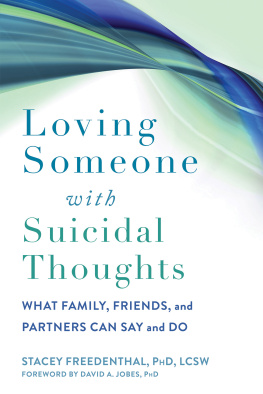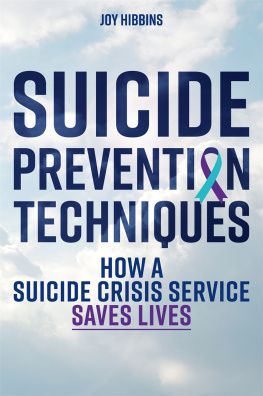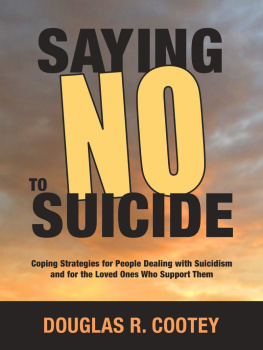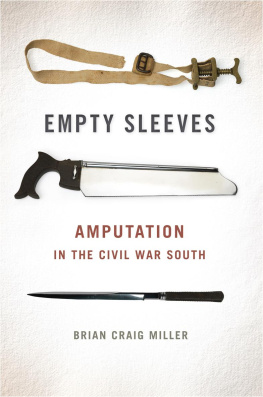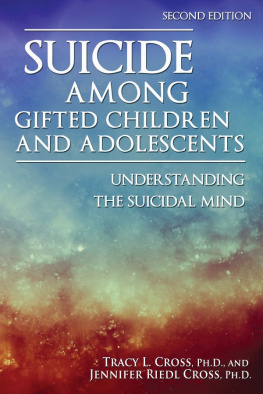Contents
Guide
Pagebreaks of the print version
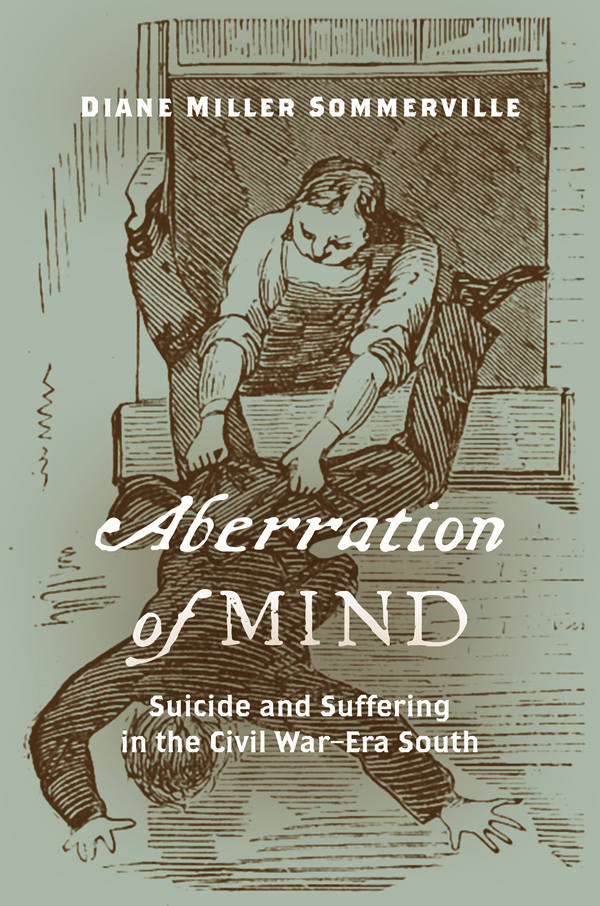
Aberration of Mind
Aberration of Mind
Suicide and Suffering in the Civil WarEra South
DIANE MILLER SOMMERVILLE
University of North Carolina Press
Chapel Hill
This book was published with the assistance of the Fred W. Morrison Fund of the University of North Carolina Press.
2018 The University of North Carolina Press
All rights reserved
Set in Adobe Text Pro by Westchester Publishing Services
Manufactured in the United States of America
The University of North Carolina Press has been a member of the Green Press Initiative since 2003.
Library of Congress Cataloging-in-Publication Data
Names: Sommerville, Diane Miller, author.
Title: Aberration of mind : suicide and suffering in the Civil War-era South / Diane Miller Sommerville.
Description: Chapel Hill : University of North Carolina Press, [2018] | Includes bibliographical references and index.
Identifiers: LCCN 2018005196 | ISBN 9781469643564 (cloth : alk. paper) | ISBN 9781469643304 (pbk : alk. paper) | ISBN 9781469643571 (ebook)
Subjects: LCSH: SuicideSouthern StatesHistory19th century. | SuicideSocial aspectsSouthern StatesHistory19th century. | United StatesHistoryCivil War, 18611865Psychological aspects. | Southern StatesSocial conditionsHistory19th century.
Classification: LCC HV 6548. U 52 S 66 2018 | DDC 362.280975/09034dc23
LC record available at https://lccn.loc.gov/2018005196
Cover illustration from Rescue of a Would-Be Suicide, in Vicksburg, Miss., Sporting Times and Theatrical News , 2 October 1869, 5. Courtesy, American Antiquarian Society.
Portions of this book were previously published in a different form and used here with permission. Portions of chapter 1 appeared as A Burden Too Heavy to Bear: War Trauma, Suicide, and Confederate Soldiers, Civil War History 59:4 (December 2013): 45391. Portions of chapters 5 and 6 appeared as Will They Ever Be Able to Forget?: Confederate Soldiers and Mental Illness in the Defeated South, in Weirding the War: Stories from the Civil Wars Ragged Edges , edited by Stephen Berry (Athens: University of Georgia Press, 2011), 32139. Portions of chapter 8 appeared as Cumberer of the Earth: Suffering and Suicide among the Faithful in the Civil War South, in Death and the American South , edited by Craig Thompson Friend and Lorri Glover (New York: Cambridge University Press, 2015), 15380.
For my family,
Donny, Shannon, and Jackson,
with love and gratitude.
Contents
Figures
, 32
Acknowledgments
Having spent over a decade living with and working on death and dying, the backing and good humor of friends, family, and colleagues has been critical in keeping me grounded in life and living. It is a pleasure to thank publicly the many individuals and institutions that provided support to me and this research project. I have enjoyed financial support from a number of institutions that was vital to the completion of this book. The dean of Harpur College of Arts and Sciences and now provost at Binghamton University, Donald Nieman, made available research funds and endorsed leaves that allowed me to travel, research, and write. I was the recipient of a National Endowment for the Humanities Fellowship that permitted me to step away from my teaching obligations for a year to focus entirely on this work. I received research fellowships from the Southern Baptist Historical Library and Archives, the North Caroliniana Society, and the Virginia Historical Society that facilitated travel to crucial repositories, for which I am thankful.
I am exceedingly grateful to the anonymous readers of this book in manuscript form who shared incredibly smart and insightful suggestions that helped me to rethink my approach and strengthen my argument, but who also gently nudged me to sharpen my analysis and clarify my thinking. They also were terrific boosters. The editorial and production team at the University of North Carolina PressChuck Grench, Jad Adkins, Cate Hodorowicz, and Jay Mazzocchiwas great at every stage of the process and provided much-needed assistance at critical junctures, most notably when a family health crisis materialized during copyediting and threatened the production schedule. Beatrice Burton provided expert indexing support. I had critical last-minute help securing images from Terri L. Snyder, Beth Kilmarx, Liz Argentieri, and Andrew Fagal.
Portions of this book appear in previously published works, and I am grateful for the permission to reprint some of that repurposed material here. Lesley Gordon, the editor at Civil War History , encouraged me to submit my work on Confederate soldiers for consideration. I am glad she did. Two anonymous readers provided helpful critiques that made the article better. I received invitations to participate in two conferences that resulted in publications. In 2009, Stephen Berry ran a conference at the University of Georgia at which I presented a paper that eventually appeared as a chapter in a book he edited, Weirding the War: Stories from the Civil Wars Ragged Edges . Portions of that essay appear in chapters 5 and 6 in this book. Two years later, I attended a conference at North Carolina State University that resulted in the publication of a chapter in Death and the American South , edited by Craig Thompson Friend and Lorri Glover. That piece is reworked as chapter 8. I appreciate the opportunity to have my work appear in these fine anthologies shepherded by such talented and mindful editors and for the feedback of the participants of the conferences they convened. I thank the University of Georgia Press and Cambridge University Press for allowing me to reprint portions of those chapters in this book.
Much of the material presented here was vetted at professional conferences and workshops at which I received valuable feedback from audiences, co-panelists, and commentators including Victor Bailey, Rick Bell, Jane Turner Censer, Doug Egerton, Michael Kral, Chandra Manning, Christopher Phillips, David Silkenat, Terri L. Snyder, and Sasha Turner. I am pleased to have been part of the programs sponsored by the following professional organizations and gatherings: the British American Nineteenth-Century Historians, Society for Historians of the Early American Republic, Social Sciences History Association, Southern Historical Association, Society for Civil War Historians, Organization of American Historians, Civil War Institute at Gettysburg College, Southern Association for Women Historians, Kentucky Civil War Governors Symposium, and Upstate Early American History Workshop at Binghamton University.
I have learned that in the academy there is nothing more valued than time. So it is with deep appreciation that I acknowledge the extraordinary generosity of professional friends and colleagues who have provided much-needed critiques and suggestions over the years. The club of suicide historians in the United States is a small but supportive group. Terri L. Snyder, David Silkenat, Alison Efford, and Rick Bell graciously offered their ideas on my work without an iota of territorial jealousy. They are the embodiment of collegiality. A number of historian friends and acquaintances took time away from their own busy lives to read portions of my work, for which I am grateful and I promise to repay in kind: Jane Turner Censer, Doug Egerton, Carole Emberton, Lorri Glover, Lesley Gordon, Matt Hulbert, J. David Hacker, Earl Hess, Sean Kelley, Howard I. Kushner, Megan Kate Nelson, Rob Parkinson, Anne Sarah Rubin, Jeff Strickland, and Mitchell Snay. I also owe a debt to those who read my work, sang my praises, and wrote letters on my behalf. Thank you Jane Turner Censer, John Inscoe, and Jan Lewis.


